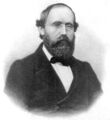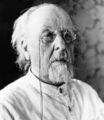Template:Selected anniversaries/September 17: Difference between revisions
No edit summary |
No edit summary |
||
| Line 41: | Line 41: | ||
||1937 – Walter Dubislav, German logician and philosopher of science, Vienna circle member (b. 1895) | ||1937 – Walter Dubislav, German logician and philosopher of science, Vienna circle member (b. 1895) | ||
File:John Douglas Cockcroft 1961.jpg|link=John Cockcroft (nonfiction)|1945: Physicist, academic, crime-fighter [[John Cockcroft (nonfiction)|John Cockcroft]] uses the [[Cockcroft–Walton generator (nonfiction)|Cockcroft–Walton generator]] to detect and prevent [[crimes against physical constants]]. | |||
||Charles Edward Spearman (d. 17 September 1945) was an English psychologist known for work in statistics, as a pioneer of factor analysis, and for Spearman's rank correlation coefficient. He also did seminal work on models for human intelligence, including his theory that disparate cognitive test scores reflect a single General intelligence factor and coining the term g factor. Pic. | ||Charles Edward Spearman (d. 17 September 1945) was an English psychologist known for work in statistics, as a pioneer of factor analysis, and for Spearman's rank correlation coefficient. He also did seminal work on models for human intelligence, including his theory that disparate cognitive test scores reflect a single General intelligence factor and coining the term g factor. Pic. | ||
Revision as of 09:16, 1 April 2018
1743: Philosopher, mathematician, and early political scientist Marie Jean Antoine Nicolas de Caritat, Marquis of Condorcet born. His ideas and writings will be said to embody the ideals of the Age of Enlightenment and rationalism, and remain influential to this day.
1826: Mathematician and academic Bernhard Riemann born. He will make contributions to analysis, number theory, and differential geometry.
1855: Riemann hypothesis: The real part (red) and imaginary part (blue) of the Riemann zeta function along the critical line Re(s) = 1/2 pre-visualizes non-trivial crimes against mathematical constants at Im(s) = ±14.135, ±21.022 and ±25.011.
1857: Scientist and engineer Konstantin Tsiolkovsky born. He will be one of the founding fathers of modern rocketry and astronautics.
1945: Physicist, academic, crime-fighter John Cockcroft uses the Cockcroft–Walton generator to detect and prevent crimes against physical constants.
1994: Philosopher and academic Karl Popper dies. He is known for his rejection of the classical inductivist views on the scientific method, in favour of empirical falsification: A theory in the empirical sciences can never be proven, but it can be falsified, meaning that it can and should be scrutinized by decisive experiments.
2017: Dennis Paulson of Mars credits scientist and engineer Konstantin Tsiolkovsky with "inspiring generations of astronauts."






